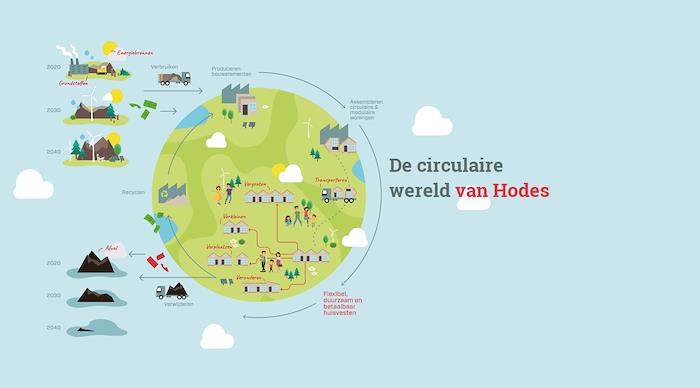In short
- The construction sector is a major polluter and must focus on a more responsible use of raw materials and energy sources.
- In the context of GROW Green, Antonie ter Harmsel spoke about which circular solutions Hodes Huisvesting has to offer.
- It is time for a new form of housing; flexibility is becoming more and more central in our lives, and housing should adapt to this.
Global Goal

The construction sector is very polluting, while the high demand for housing must be met in a sustainable and future-proof manner. In other words, we need a new way of living, and Hodes Huisvesting is committed to this. “A home becomes living, architecture becomes product design, contracting becomes supplying. Building traditionally at a weather-dependent construction site becomes assembling at a factory, under conditioned circumstances. To make housing fully future-oriented, we at Hodes think in permanent flexibility. In real building methods with proven methods and techniques. In reuse and remountable construction”, says Antonie ter Harmsel, owner of Hodes Huisvesting. As a result, housing structurally requires less space, raw materials and energy. And it is possible to have a quick and efficient response to existing and latent needs. “We are committed to contributing to better housing for people and the earth. Every day!”, Antonie says.
Hodes was founded and 1925 and was active in traditional housing in its early years. Temporary housing was added to this in the sixties. From 1970 onwards, Hodes started to focus entirely on temporary housing in unit construction. In 1993, Hodes became part of Hegeman and, in addition to unit construction, they also specialised in modular construction. In the years that followed, Hodes acquired a strong market position in both temporary and semi-permanent housing in both modular and unit construction. Since 2000, the market started changing, and there was an increasing need for high-quality architecture, better quality and more flexibility. The concepts were tailored to this. At the beginning of 2017, Hodes’ management took over the company. In addition to housing concepts, Hodes now also offers complete target group-specific products.

“Our housing nowadays is very different from the past.” Hodes is a pioneer in the market when it comes to flexible, sustainable and affordable living. “We take responsibility for the entire life cycle; we design, realise and manage accommodation specifically for Learning, Recreation and Living & Care. We don’t do this alone, but together with our customers, stakeholders and co-creators.” The concepts and products of Hodes are implemented in units and modules. Hodes distinguishes itself as a provider of permanent housing, with the flexibility of temporary housing. Hodes is a frontrunner when it comes to circularity: “We think about the future, the experience of housing and the (re)use of materials and energy. Building for eternity becomes future-oriented housing. If we continue this housing for eternity and do not respond to latent needs, we will keep the same problems that we face today.”
At the end of the period of use, housing from Hodes can be easily dismantled and reused at another location. Because the housing can grow along with wishes, needs and innovations during the period of use, it will remain up to date. And it is therefore perfectly reusable for the same target group at a different location. Thanks to the well-thought-out building method, they can also remodel and reuse the building units.
Related article(s)
Antonie sees it as his mission, and that of his company, to contribute to a better world for tomorrow, for people and for the environment: “For us, the people come first. We want to contribute to a society where people are happy and can take care of each other. Lasting well-being also requires a sustainable, livable earth. For ourselves, our children and our grandchildren. That is why we use our space, raw materials and energy sources responsibly.” This Twente company has an important contribution to this goal. Not only by building in a sustainable and future-oriented way but also by thinking about inclusiveness on the labour market. “We are being socially responsible by involving people with disabilities in the labour process, and we offer internships and graduation projects. We think about the future of society and our role in it, and what this means for our work.” Antonie is constantly working on sustainability and improving processes at Hodes: “Something good for now can be better tomorrow!”
According to Antonie, the construction sector is undergoing a radical transition. It used to be the builder, but the customer is in the driver’s seat nowadays. In addition, products need to be sustainable. Processes must be fast, smooth, and optimally manageable. The principles of industrial production have an increasing influence on construction. “It is time to let go of traditional ways of thinking and to start thinking in terms of new possibilities.” Antonie does face a problem with this. He also requests help: “How do we increase awareness about the importance of becoming circular with our clients? We are in a transition from the traditional construction sector to an industrial construction sector, but the importance of this is not always understood.” Do you have the answer for Antonie? Or do you have a circular idea that you need some help with? Send an email to growgreen@twente.com.
Date: 7 February 2020 |
Source of tekst: Hodes Huisvesting |





